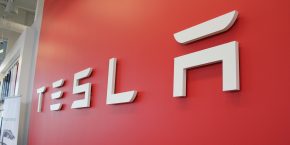

Tesla CTO and co-founder, JB Straubel, was at the International Transport Forum (ITF) for an interesting panel on innovations in transportation this week in Leipzig, Germany. The automotive executive was facing panelists that were promoting pedestrian options, bicycles and even fuel cell-hydrogen as means to innovate in transport, which led to some interesting conversations.
You can watch the entire panel below but since it’s over an hour-long, I made a quick transcript of the most interesting parts below.
When asked about where there’s still room for innovation in electric vehicles. Straubel answered:
“Cost is still the biggest challenge for greater adoption of electric vehicles, and it might not seems like the most S≡XY and exciting topic for innovation, but innovation that drives down cost is the focus.”
JB then elaborated on the technical side:
“On the technical side, that comes in term of energy storage research; chemistry research, material science to make better batteries, and improve materials and reduce the cost. There’s a lot of room to improve there. It’s nowhere near the fundamental ceiling or physics limits yet. It’s an exciting and vibrant area.”
He added his insights on autonomous driving also:
“Also in software and controls. I didn’t touch on that before, but that’s a field that’s incredibly exciting and changing faster than the energy storage space. All the technologies around sensors and mobile computing power that can live on-board the car, and the software that can do imagine recognition – taking the signal from those cameras and then turn them into something very usable for the computer in the car to control itself with.”
Straubel referred to the rate at which control software is improving as “ridiculously fast”.
Later on during the Q&A session, he went on a quick rant on hydrogen fuel cells:
“I am not a fan of hydrogen. I do not see a future for hydrogen as a transportation fuel. The efficiency from going to the primary energy source, wherever you are creating the hydrogen – whether it’s solar, wind and hopefully it is sustainable – going all the way to the energy consumed in the vehicle is very inefficient.
I think it is kind of an intellectually attractive idea because I see everyone saying “hydrogen is abundant, it’s just like water”, but those are totally irrelevant points for using hydrogen in transportation.
What you need to look at is the efficiency of going from primary energy to consumed energy, and hydrogen vehicles use roughly three times more than an electric vehicle. That’s a fundamentally a tough limit. If all the other economic issues can be sorted out, you end up in a place that’s going three times more per mile to drive and has a three times more environmental footprint.
There’s also a very tough infrastructure problem with hydrogen vehicles that no one has been able to solve. In my home state in California, there’s a big effort to try to promote hydrogen vehicles, but the infrastructure has lagged behind. The difficulty of putting a hydrogen fueling station is extreme – the permitting process, people don’t want them in their neighborhood – we have something like 5 or 10 stations in the entire state. That’s over years of development, they haven’t been able to expand it rapidly.
I think there’s a really tough chicken and egg problem here. I don’t see the future. I believe batteries will end up improving faster and making hydrogen a bit irrelevant.”
He also commented on what Tesla could potentially do in the truck industry – again focusing on cost:
“I can’t say too much about the new products and the things we are developing, but from a pure technology point of view, everything that we’ve done on vehicles translates directly into trucks. There’s no reason that today you can’t make a very compelling electric truck. They can charge at same sort of times as a Model S – as one of our passenger vehicles – and have the same economy of operation.
That sector hasn’t seen the same type of innovation. It’s a bit more conservative and obviously people don’t want to take risks on the end business, which is to move kilograms from A to B, but I think we will see that coming back – especially perhaps as fuel prices tend to rebound. You know there was a lot more interest in this a few years ago when fuel prices were much higher.”
During the panel, Straubel was at odds with the other panelists since they were mainly promoting ways to change people’s habits for a more sustainable future of transportation – whether it’d be through bicycles or easier pedestrian options – while Tesla is trying to change current technologies without having to force compromises on people.
Here’s the video in full:
FTC: We use income earning auto affiliate links. More.




Comments